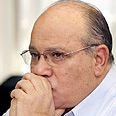Mossad: 1 nuclear bomb won’t suffice Iran
Mossad Chief Meir Dagan says during Knesset’s Foreign Affairs and Defense Committee meeting, ‘Iranian strategic decision to reach nuclear independence exists; they won't stop when they reach the level which would supply one bomb, but will continue and create more fissionable material’
“An Iranian strategic decision to reach nuclear independence exists. The fear is that they continue and succeed in reaching fissionable material,” Dagan said.
“They won't stop when they reach the level which would supply one bomb, but will continue and create more fissionable material."
The Mossad head said that "there is much importance in bringing the matter in front of the Security Council, which will impose economic sanctions on Iran. Forty percent of Iran's fuel needs are imported, and sanctions like these would be very significant."
He added that there is internal criticism in Iran over President Mahmoud Ahmadinejad's leadership from a number of sources, including former president Akbar Hashemi Rafsanjani.
This did not, however, signify that a regime change was on the way, nor was the internal criticism out of the ordinary, Dagan explained.
In fact, internal conflict could cause Iran's nuclear foreign policy to become radicalized, in order to cover up the internal feuding.
Dagan said that Ahmadinjad's election marked the takeover of power of the conservative camp in Iran. The new president represents the second generation of the revolution, and this certainly has an effect on the economy, he said.
The Mossad chief said that Israeli and Jewish targets hold an honorary place in the list of targets of the global jihad.
"Israel is an integral part of the conflict," he said.
"This phenomenon also worries countries like Egypt, Syria, and Lebanon, which feel that their governments are endangered," he added.
Threat of Jihad
"This phenomenon has independent infrastructures in each and every place," warned Dagan.
He added that "in Israel, we have not yet identified any global jihad infrastructure, nor have we seen it in the territories, but there have been, here or there, first signs, as opposed to the goal of Islamic Jihad, which talks of setting up one large Islamic ummah (community of believers)."
The Mossad head said that "the phenomenon which will keep us busy in the coming years are the "Iraq graduates" who took part in the conflict with the Americans, and who are now returning to their original countries, and beginning to build infrastructures. We've seen similar manifestations in Jordan and in Egypt. The most absurd thing is that as much as the American struggle in Iraq succeeds, so too does the security threat to Israel."
Regarding the threat posed to Israeli and Jewish targets abroad, Dagan said that "threats constantly exist in all areas, but there is cooperation between the intelligence agencies of various countries."
'Iran will have nukes within two years'
Knesset Member Yuval Steinitz (Likud), chairman of the Knesset's Foreign Affairs and Defense Committee, said if Iran continues its nuclear development projects with no interruptions, it will obtain a nuclear bomb within two years.
"Within a period of one or two years they will have a nuclear bomb, and then we will have a new Middle East – threatening, black and dangerous," Steinitz said.
Earlier, IDF Intelligence Chief Major-General Aharon Zeevi-Farkash said that "Iran is determined to a nuclear ability and ground to ground missiles. It is turning into a regional power. I don't see a realistic opportunity for our diplomatic capabilities, and that of the world, to stand in Iran's way. With that, I don't want us to be understood as if we're saying hands have to be raised. We must continue with political and economic sanctions," he said.
















